MKT3017 - Marketing Audit of Unilever PLC in UK Market - Report
VerifiedAdded on 2023/06/16
|13
|3222
|445
Report
AI Summary
This report presents a comprehensive marketing audit of Unilever PLC, focusing specifically on its operations within the UK market. It begins with an introduction to marketing management principles and Unilever's background, followed by a macro-environmental analysis using the PESTLE framework, examining political, economic, social, technological, legal, and environmental factors impacting Unilever's business. A micro-analysis explores the roles of customers, employees, suppliers, and market intermediaries in Unilever's value chain. The report includes a competitive analysis, utilizing strategic group analysis and perceptual mapping to position Unilever against key competitors like Procter & Gamble and Nestle. A SWOT analysis identifies Unilever's strengths, weaknesses, opportunities, and threats, offering insights into its strategic positioning and potential for growth. The report concludes by summarizing the key findings and their implications for Unilever's marketing strategies in the UK.
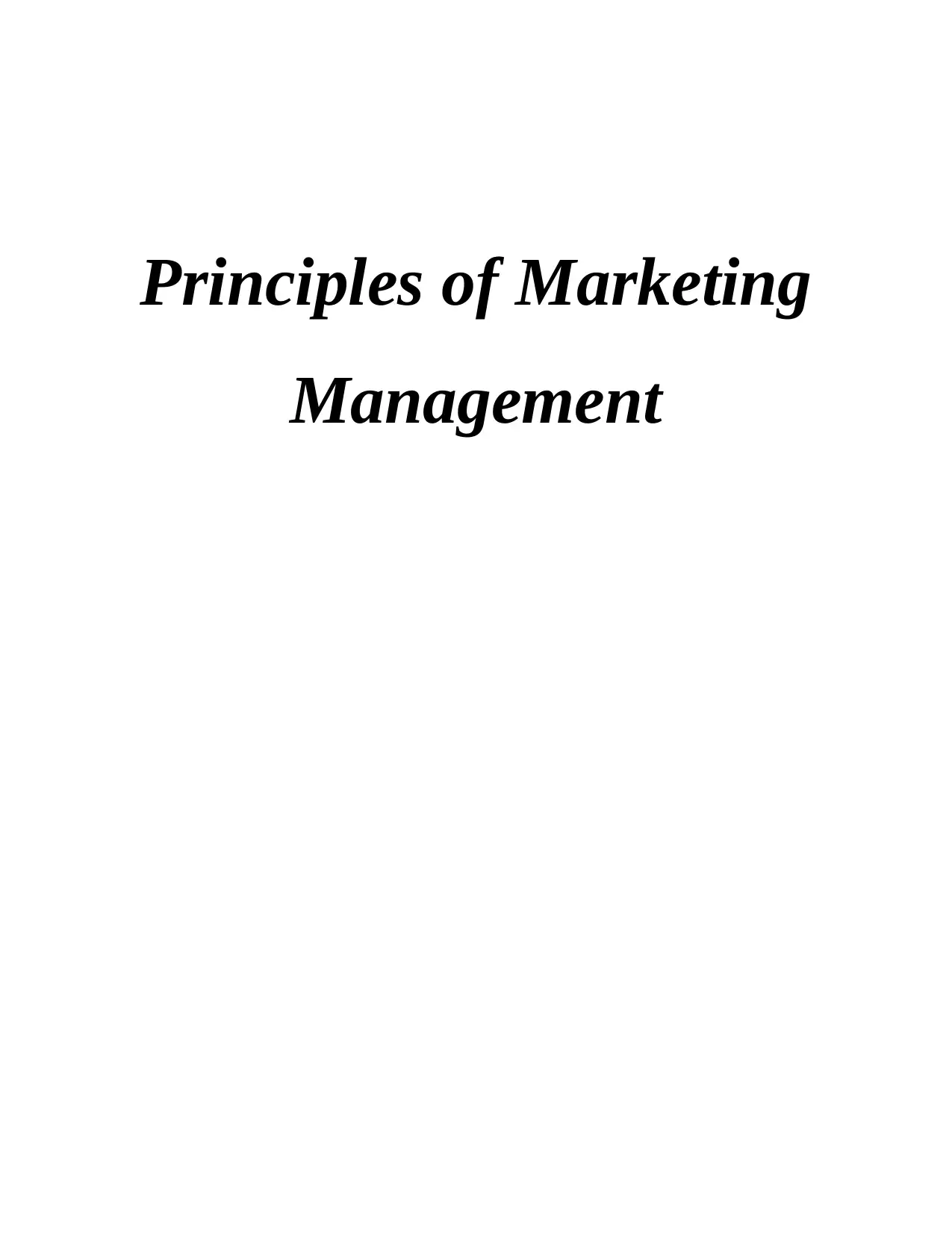
Principles of Marketing
Management
Management
Paraphrase This Document
Need a fresh take? Get an instant paraphrase of this document with our AI Paraphraser
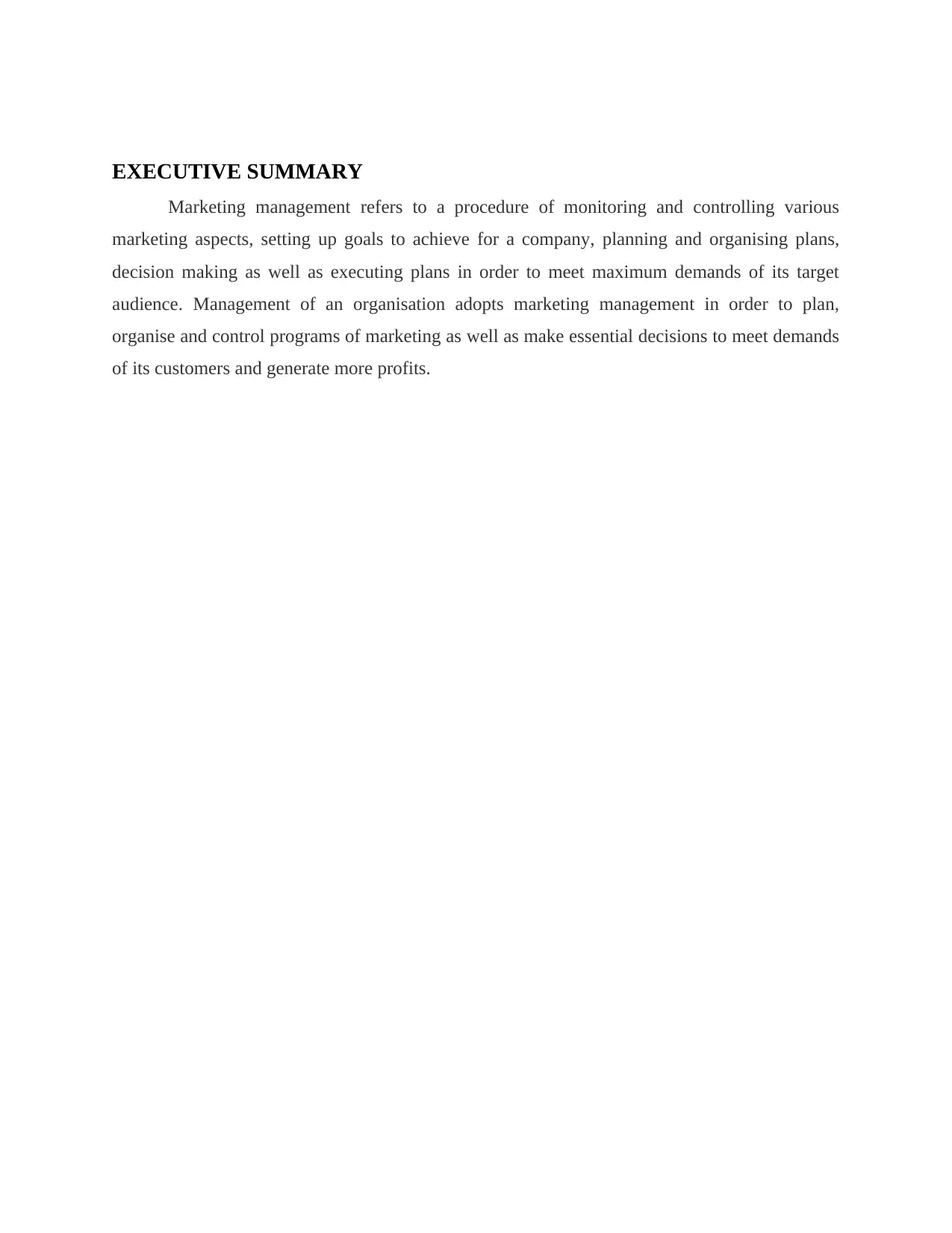
EXECUTIVE SUMMARY
Marketing management refers to a procedure of monitoring and controlling various
marketing aspects, setting up goals to achieve for a company, planning and organising plans,
decision making as well as executing plans in order to meet maximum demands of its target
audience. Management of an organisation adopts marketing management in order to plan,
organise and control programs of marketing as well as make essential decisions to meet demands
of its customers and generate more profits.
Marketing management refers to a procedure of monitoring and controlling various
marketing aspects, setting up goals to achieve for a company, planning and organising plans,
decision making as well as executing plans in order to meet maximum demands of its target
audience. Management of an organisation adopts marketing management in order to plan,
organise and control programs of marketing as well as make essential decisions to meet demands
of its customers and generate more profits.
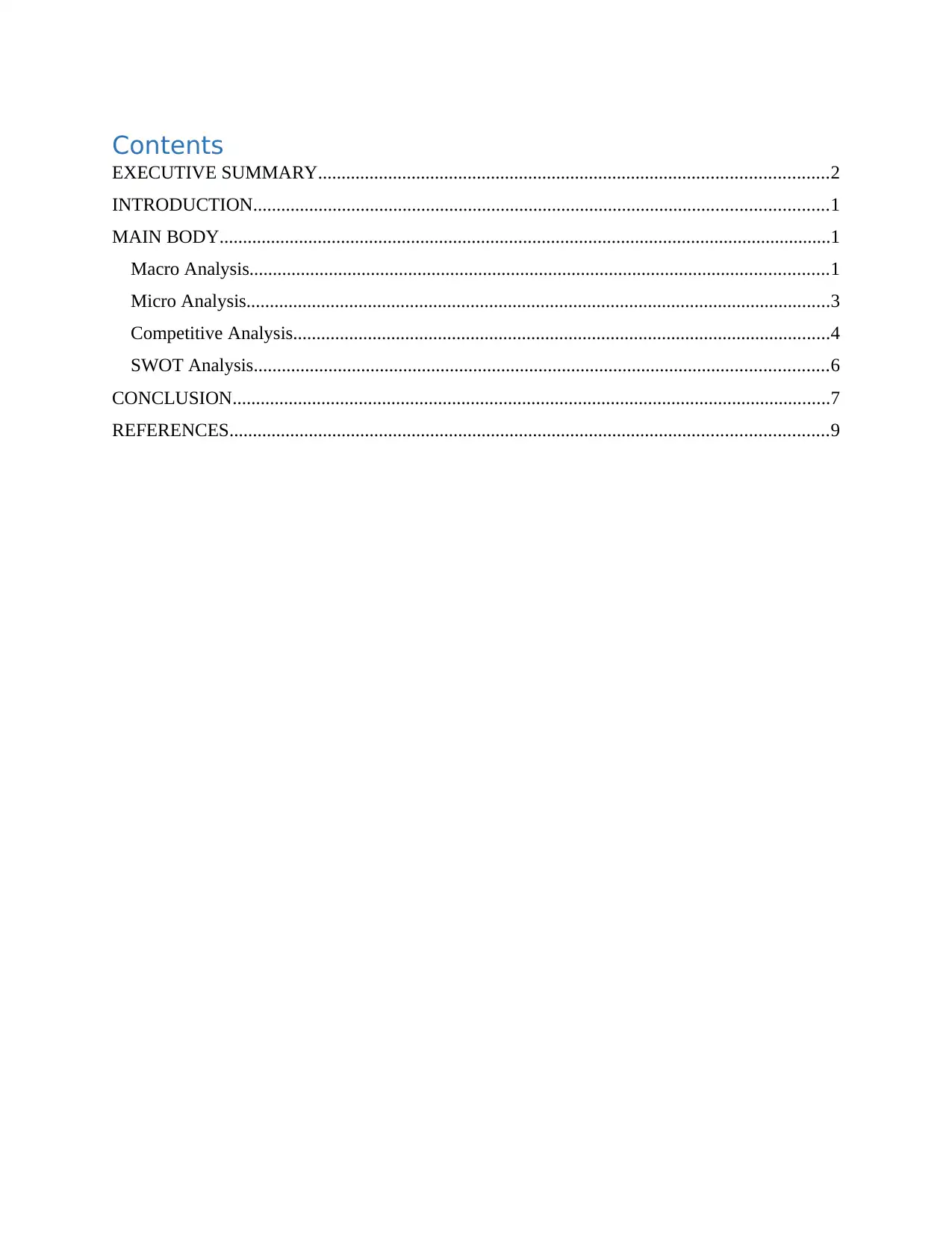
Contents
EXECUTIVE SUMMARY.............................................................................................................2
INTRODUCTION...........................................................................................................................1
MAIN BODY...................................................................................................................................1
Macro Analysis............................................................................................................................1
Micro Analysis.............................................................................................................................3
Competitive Analysis...................................................................................................................4
SWOT Analysis...........................................................................................................................6
CONCLUSION................................................................................................................................7
REFERENCES................................................................................................................................9
EXECUTIVE SUMMARY.............................................................................................................2
INTRODUCTION...........................................................................................................................1
MAIN BODY...................................................................................................................................1
Macro Analysis............................................................................................................................1
Micro Analysis.............................................................................................................................3
Competitive Analysis...................................................................................................................4
SWOT Analysis...........................................................................................................................6
CONCLUSION................................................................................................................................7
REFERENCES................................................................................................................................9
⊘ This is a preview!⊘
Do you want full access?
Subscribe today to unlock all pages.

Trusted by 1+ million students worldwide
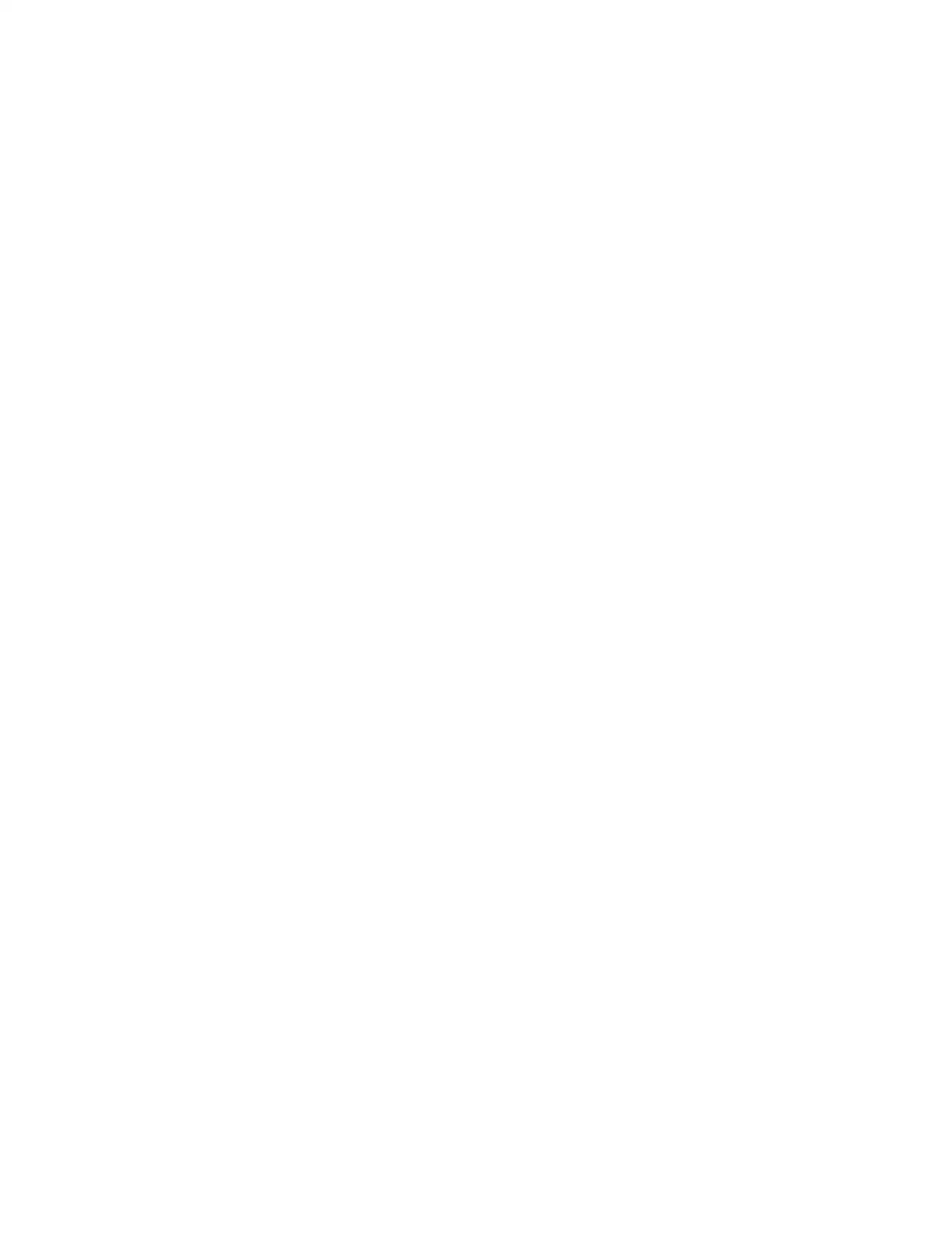
Paraphrase This Document
Need a fresh take? Get an instant paraphrase of this document with our AI Paraphraser
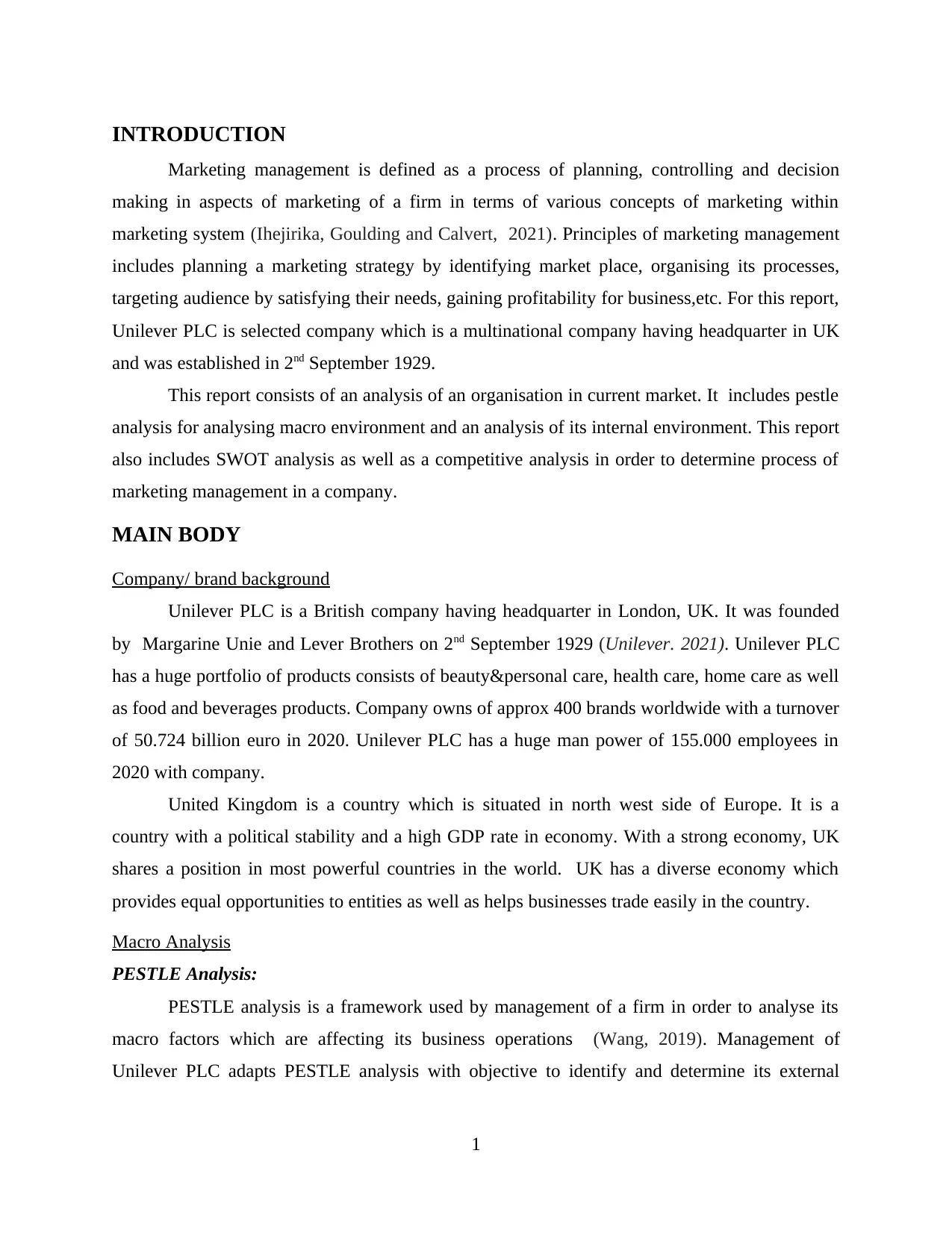
INTRODUCTION
Marketing management is defined as a process of planning, controlling and decision
making in aspects of marketing of a firm in terms of various concepts of marketing within
marketing system (Ihejirika, Goulding and Calvert, 2021). Principles of marketing management
includes planning a marketing strategy by identifying market place, organising its processes,
targeting audience by satisfying their needs, gaining profitability for business,etc. For this report,
Unilever PLC is selected company which is a multinational company having headquarter in UK
and was established in 2nd September 1929.
This report consists of an analysis of an organisation in current market. It includes pestle
analysis for analysing macro environment and an analysis of its internal environment. This report
also includes SWOT analysis as well as a competitive analysis in order to determine process of
marketing management in a company.
MAIN BODY
Company/ brand background
Unilever PLC is a British company having headquarter in London, UK. It was founded
by Margarine Unie and Lever Brothers on 2nd September 1929 (Unilever. 2021). Unilever PLC
has a huge portfolio of products consists of beauty&personal care, health care, home care as well
as food and beverages products. Company owns of approx 400 brands worldwide with a turnover
of 50.724 billion euro in 2020. Unilever PLC has a huge man power of 155.000 employees in
2020 with company.
United Kingdom is a country which is situated in north west side of Europe. It is a
country with a political stability and a high GDP rate in economy. With a strong economy, UK
shares a position in most powerful countries in the world. UK has a diverse economy which
provides equal opportunities to entities as well as helps businesses trade easily in the country.
Macro Analysis
PESTLE Analysis:
PESTLE analysis is a framework used by management of a firm in order to analyse its
macro factors which are affecting its business operations (Wang, 2019). Management of
Unilever PLC adapts PESTLE analysis with objective to identify and determine its external
1
Marketing management is defined as a process of planning, controlling and decision
making in aspects of marketing of a firm in terms of various concepts of marketing within
marketing system (Ihejirika, Goulding and Calvert, 2021). Principles of marketing management
includes planning a marketing strategy by identifying market place, organising its processes,
targeting audience by satisfying their needs, gaining profitability for business,etc. For this report,
Unilever PLC is selected company which is a multinational company having headquarter in UK
and was established in 2nd September 1929.
This report consists of an analysis of an organisation in current market. It includes pestle
analysis for analysing macro environment and an analysis of its internal environment. This report
also includes SWOT analysis as well as a competitive analysis in order to determine process of
marketing management in a company.
MAIN BODY
Company/ brand background
Unilever PLC is a British company having headquarter in London, UK. It was founded
by Margarine Unie and Lever Brothers on 2nd September 1929 (Unilever. 2021). Unilever PLC
has a huge portfolio of products consists of beauty&personal care, health care, home care as well
as food and beverages products. Company owns of approx 400 brands worldwide with a turnover
of 50.724 billion euro in 2020. Unilever PLC has a huge man power of 155.000 employees in
2020 with company.
United Kingdom is a country which is situated in north west side of Europe. It is a
country with a political stability and a high GDP rate in economy. With a strong economy, UK
shares a position in most powerful countries in the world. UK has a diverse economy which
provides equal opportunities to entities as well as helps businesses trade easily in the country.
Macro Analysis
PESTLE Analysis:
PESTLE analysis is a framework used by management of a firm in order to analyse its
macro factors which are affecting its business operations (Wang, 2019). Management of
Unilever PLC adapts PESTLE analysis with objective to identify and determine its external
1
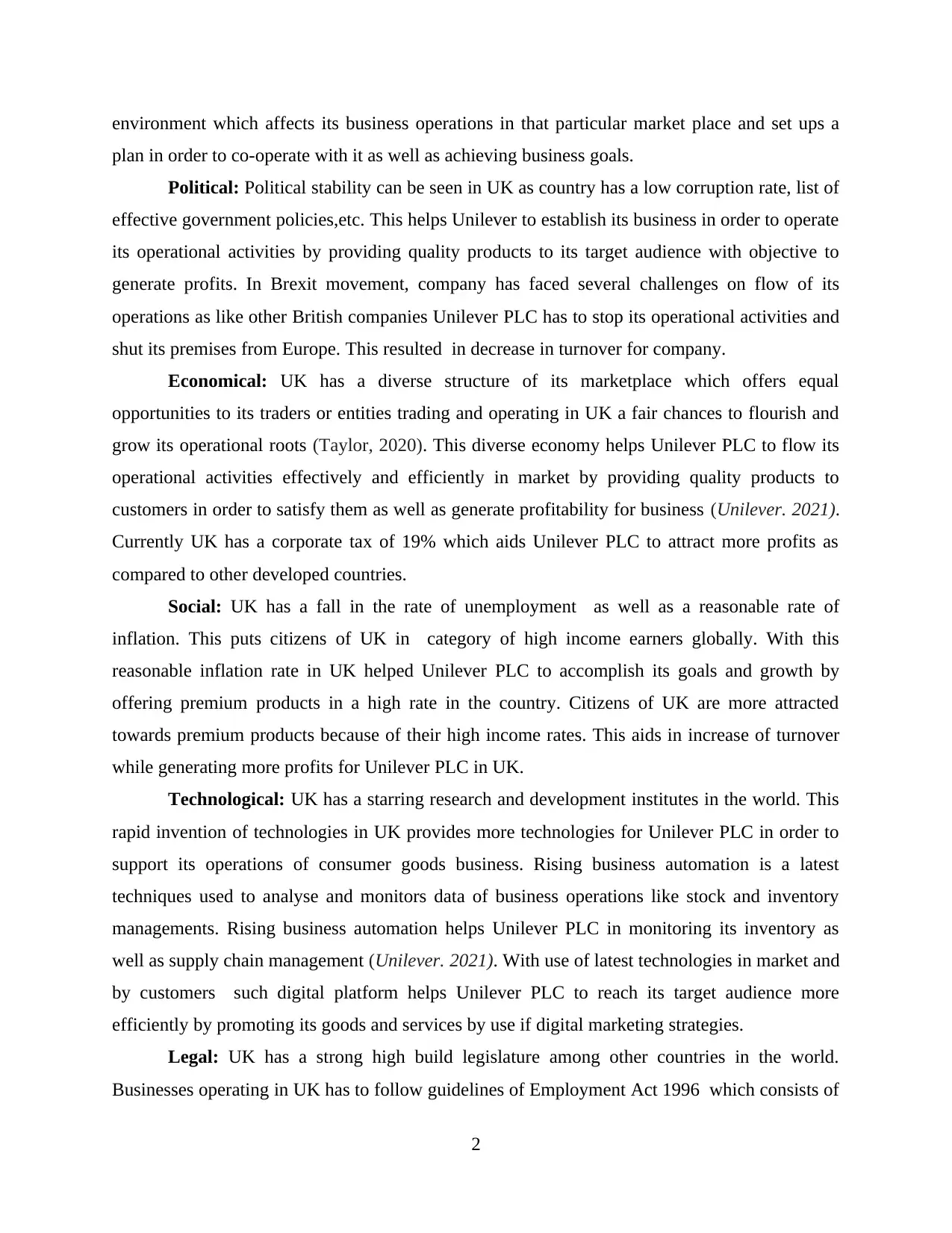
environment which affects its business operations in that particular market place and set ups a
plan in order to co-operate with it as well as achieving business goals.
Political: Political stability can be seen in UK as country has a low corruption rate, list of
effective government policies,etc. This helps Unilever to establish its business in order to operate
its operational activities by providing quality products to its target audience with objective to
generate profits. In Brexit movement, company has faced several challenges on flow of its
operations as like other British companies Unilever PLC has to stop its operational activities and
shut its premises from Europe. This resulted in decrease in turnover for company.
Economical: UK has a diverse structure of its marketplace which offers equal
opportunities to its traders or entities trading and operating in UK a fair chances to flourish and
grow its operational roots (Taylor, 2020). This diverse economy helps Unilever PLC to flow its
operational activities effectively and efficiently in market by providing quality products to
customers in order to satisfy them as well as generate profitability for business (Unilever. 2021).
Currently UK has a corporate tax of 19% which aids Unilever PLC to attract more profits as
compared to other developed countries.
Social: UK has a fall in the rate of unemployment as well as a reasonable rate of
inflation. This puts citizens of UK in category of high income earners globally. With this
reasonable inflation rate in UK helped Unilever PLC to accomplish its goals and growth by
offering premium products in a high rate in the country. Citizens of UK are more attracted
towards premium products because of their high income rates. This aids in increase of turnover
while generating more profits for Unilever PLC in UK.
Technological: UK has a starring research and development institutes in the world. This
rapid invention of technologies in UK provides more technologies for Unilever PLC in order to
support its operations of consumer goods business. Rising business automation is a latest
techniques used to analyse and monitors data of business operations like stock and inventory
managements. Rising business automation helps Unilever PLC in monitoring its inventory as
well as supply chain management (Unilever. 2021). With use of latest technologies in market and
by customers such digital platform helps Unilever PLC to reach its target audience more
efficiently by promoting its goods and services by use if digital marketing strategies.
Legal: UK has a strong high build legislature among other countries in the world.
Businesses operating in UK has to follow guidelines of Employment Act 1996 which consists of
2
plan in order to co-operate with it as well as achieving business goals.
Political: Political stability can be seen in UK as country has a low corruption rate, list of
effective government policies,etc. This helps Unilever to establish its business in order to operate
its operational activities by providing quality products to its target audience with objective to
generate profits. In Brexit movement, company has faced several challenges on flow of its
operations as like other British companies Unilever PLC has to stop its operational activities and
shut its premises from Europe. This resulted in decrease in turnover for company.
Economical: UK has a diverse structure of its marketplace which offers equal
opportunities to its traders or entities trading and operating in UK a fair chances to flourish and
grow its operational roots (Taylor, 2020). This diverse economy helps Unilever PLC to flow its
operational activities effectively and efficiently in market by providing quality products to
customers in order to satisfy them as well as generate profitability for business (Unilever. 2021).
Currently UK has a corporate tax of 19% which aids Unilever PLC to attract more profits as
compared to other developed countries.
Social: UK has a fall in the rate of unemployment as well as a reasonable rate of
inflation. This puts citizens of UK in category of high income earners globally. With this
reasonable inflation rate in UK helped Unilever PLC to accomplish its goals and growth by
offering premium products in a high rate in the country. Citizens of UK are more attracted
towards premium products because of their high income rates. This aids in increase of turnover
while generating more profits for Unilever PLC in UK.
Technological: UK has a starring research and development institutes in the world. This
rapid invention of technologies in UK provides more technologies for Unilever PLC in order to
support its operations of consumer goods business. Rising business automation is a latest
techniques used to analyse and monitors data of business operations like stock and inventory
managements. Rising business automation helps Unilever PLC in monitoring its inventory as
well as supply chain management (Unilever. 2021). With use of latest technologies in market and
by customers such digital platform helps Unilever PLC to reach its target audience more
efficiently by promoting its goods and services by use if digital marketing strategies.
Legal: UK has a strong high build legislature among other countries in the world.
Businesses operating in UK has to follow guidelines of Employment Act 1996 which consists of
2
⊘ This is a preview!⊘
Do you want full access?
Subscribe today to unlock all pages.

Trusted by 1+ million students worldwide
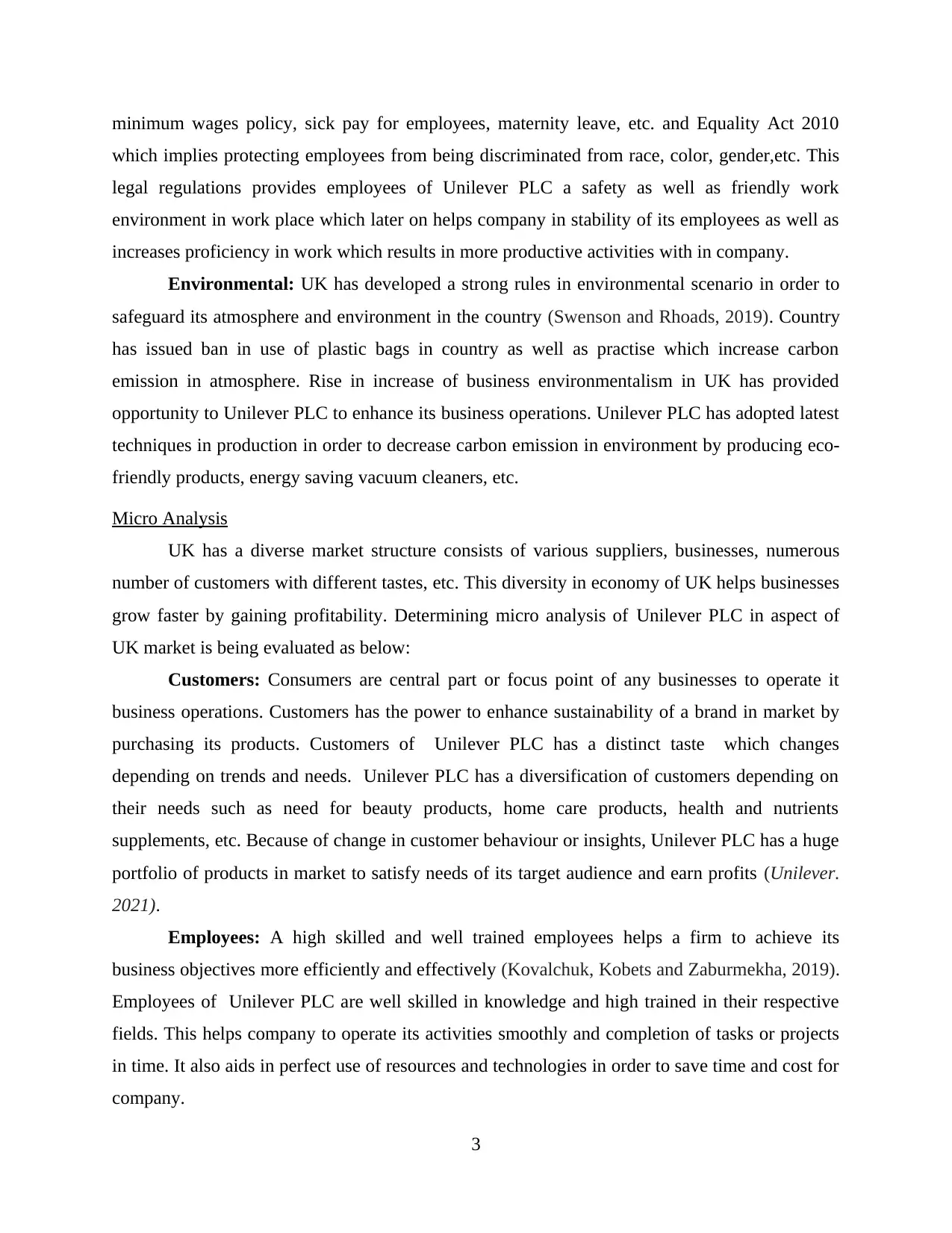
minimum wages policy, sick pay for employees, maternity leave, etc. and Equality Act 2010
which implies protecting employees from being discriminated from race, color, gender,etc. This
legal regulations provides employees of Unilever PLC a safety as well as friendly work
environment in work place which later on helps company in stability of its employees as well as
increases proficiency in work which results in more productive activities with in company.
Environmental: UK has developed a strong rules in environmental scenario in order to
safeguard its atmosphere and environment in the country (Swenson and Rhoads, 2019). Country
has issued ban in use of plastic bags in country as well as practise which increase carbon
emission in atmosphere. Rise in increase of business environmentalism in UK has provided
opportunity to Unilever PLC to enhance its business operations. Unilever PLC has adopted latest
techniques in production in order to decrease carbon emission in environment by producing eco-
friendly products, energy saving vacuum cleaners, etc.
Micro Analysis
UK has a diverse market structure consists of various suppliers, businesses, numerous
number of customers with different tastes, etc. This diversity in economy of UK helps businesses
grow faster by gaining profitability. Determining micro analysis of Unilever PLC in aspect of
UK market is being evaluated as below:
Customers: Consumers are central part or focus point of any businesses to operate it
business operations. Customers has the power to enhance sustainability of a brand in market by
purchasing its products. Customers of Unilever PLC has a distinct taste which changes
depending on trends and needs. Unilever PLC has a diversification of customers depending on
their needs such as need for beauty products, home care products, health and nutrients
supplements, etc. Because of change in customer behaviour or insights, Unilever PLC has a huge
portfolio of products in market to satisfy needs of its target audience and earn profits (Unilever.
2021).
Employees: A high skilled and well trained employees helps a firm to achieve its
business objectives more efficiently and effectively (Kovalchuk, Kobets and Zaburmekha, 2019).
Employees of Unilever PLC are well skilled in knowledge and high trained in their respective
fields. This helps company to operate its activities smoothly and completion of tasks or projects
in time. It also aids in perfect use of resources and technologies in order to save time and cost for
company.
3
which implies protecting employees from being discriminated from race, color, gender,etc. This
legal regulations provides employees of Unilever PLC a safety as well as friendly work
environment in work place which later on helps company in stability of its employees as well as
increases proficiency in work which results in more productive activities with in company.
Environmental: UK has developed a strong rules in environmental scenario in order to
safeguard its atmosphere and environment in the country (Swenson and Rhoads, 2019). Country
has issued ban in use of plastic bags in country as well as practise which increase carbon
emission in atmosphere. Rise in increase of business environmentalism in UK has provided
opportunity to Unilever PLC to enhance its business operations. Unilever PLC has adopted latest
techniques in production in order to decrease carbon emission in environment by producing eco-
friendly products, energy saving vacuum cleaners, etc.
Micro Analysis
UK has a diverse market structure consists of various suppliers, businesses, numerous
number of customers with different tastes, etc. This diversity in economy of UK helps businesses
grow faster by gaining profitability. Determining micro analysis of Unilever PLC in aspect of
UK market is being evaluated as below:
Customers: Consumers are central part or focus point of any businesses to operate it
business operations. Customers has the power to enhance sustainability of a brand in market by
purchasing its products. Customers of Unilever PLC has a distinct taste which changes
depending on trends and needs. Unilever PLC has a diversification of customers depending on
their needs such as need for beauty products, home care products, health and nutrients
supplements, etc. Because of change in customer behaviour or insights, Unilever PLC has a huge
portfolio of products in market to satisfy needs of its target audience and earn profits (Unilever.
2021).
Employees: A high skilled and well trained employees helps a firm to achieve its
business objectives more efficiently and effectively (Kovalchuk, Kobets and Zaburmekha, 2019).
Employees of Unilever PLC are well skilled in knowledge and high trained in their respective
fields. This helps company to operate its activities smoothly and completion of tasks or projects
in time. It also aids in perfect use of resources and technologies in order to save time and cost for
company.
3
Paraphrase This Document
Need a fresh take? Get an instant paraphrase of this document with our AI Paraphraser
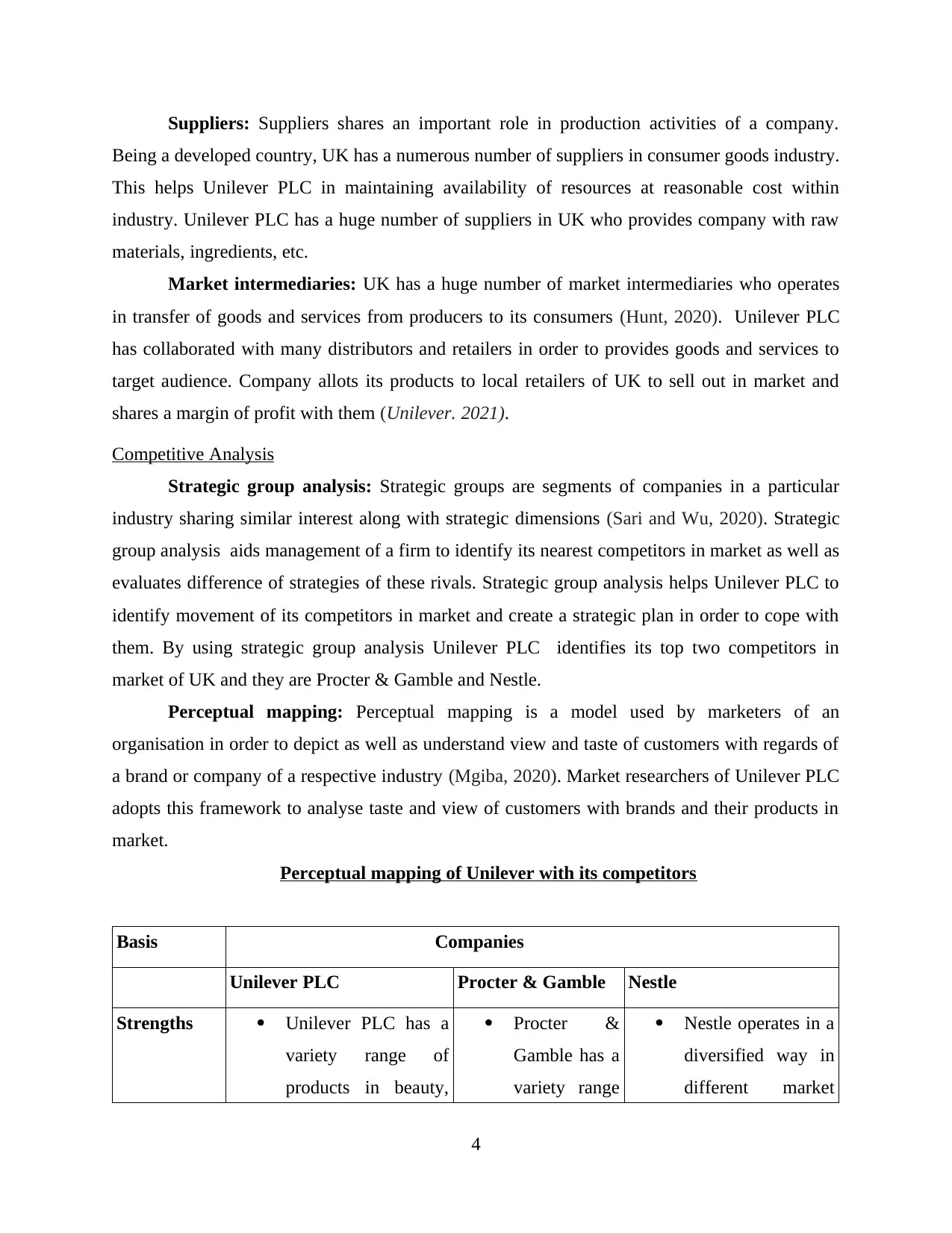
Suppliers: Suppliers shares an important role in production activities of a company.
Being a developed country, UK has a numerous number of suppliers in consumer goods industry.
This helps Unilever PLC in maintaining availability of resources at reasonable cost within
industry. Unilever PLC has a huge number of suppliers in UK who provides company with raw
materials, ingredients, etc.
Market intermediaries: UK has a huge number of market intermediaries who operates
in transfer of goods and services from producers to its consumers (Hunt, 2020). Unilever PLC
has collaborated with many distributors and retailers in order to provides goods and services to
target audience. Company allots its products to local retailers of UK to sell out in market and
shares a margin of profit with them (Unilever. 2021).
Competitive Analysis
Strategic group analysis: Strategic groups are segments of companies in a particular
industry sharing similar interest along with strategic dimensions (Sari and Wu, 2020). Strategic
group analysis aids management of a firm to identify its nearest competitors in market as well as
evaluates difference of strategies of these rivals. Strategic group analysis helps Unilever PLC to
identify movement of its competitors in market and create a strategic plan in order to cope with
them. By using strategic group analysis Unilever PLC identifies its top two competitors in
market of UK and they are Procter & Gamble and Nestle.
Perceptual mapping: Perceptual mapping is a model used by marketers of an
organisation in order to depict as well as understand view and taste of customers with regards of
a brand or company of a respective industry (Mgiba, 2020). Market researchers of Unilever PLC
adopts this framework to analyse taste and view of customers with brands and their products in
market.
Perceptual mapping of Unilever with its competitors
Basis Companies
Unilever PLC Procter & Gamble Nestle
Strengths Unilever PLC has a
variety range of
products in beauty,
Procter &
Gamble has a
variety range
Nestle operates in a
diversified way in
different market
4
Being a developed country, UK has a numerous number of suppliers in consumer goods industry.
This helps Unilever PLC in maintaining availability of resources at reasonable cost within
industry. Unilever PLC has a huge number of suppliers in UK who provides company with raw
materials, ingredients, etc.
Market intermediaries: UK has a huge number of market intermediaries who operates
in transfer of goods and services from producers to its consumers (Hunt, 2020). Unilever PLC
has collaborated with many distributors and retailers in order to provides goods and services to
target audience. Company allots its products to local retailers of UK to sell out in market and
shares a margin of profit with them (Unilever. 2021).
Competitive Analysis
Strategic group analysis: Strategic groups are segments of companies in a particular
industry sharing similar interest along with strategic dimensions (Sari and Wu, 2020). Strategic
group analysis aids management of a firm to identify its nearest competitors in market as well as
evaluates difference of strategies of these rivals. Strategic group analysis helps Unilever PLC to
identify movement of its competitors in market and create a strategic plan in order to cope with
them. By using strategic group analysis Unilever PLC identifies its top two competitors in
market of UK and they are Procter & Gamble and Nestle.
Perceptual mapping: Perceptual mapping is a model used by marketers of an
organisation in order to depict as well as understand view and taste of customers with regards of
a brand or company of a respective industry (Mgiba, 2020). Market researchers of Unilever PLC
adopts this framework to analyse taste and view of customers with brands and their products in
market.
Perceptual mapping of Unilever with its competitors
Basis Companies
Unilever PLC Procter & Gamble Nestle
Strengths Unilever PLC has a
variety range of
products in beauty,
Procter &
Gamble has a
variety range
Nestle operates in a
diversified way in
different market
4
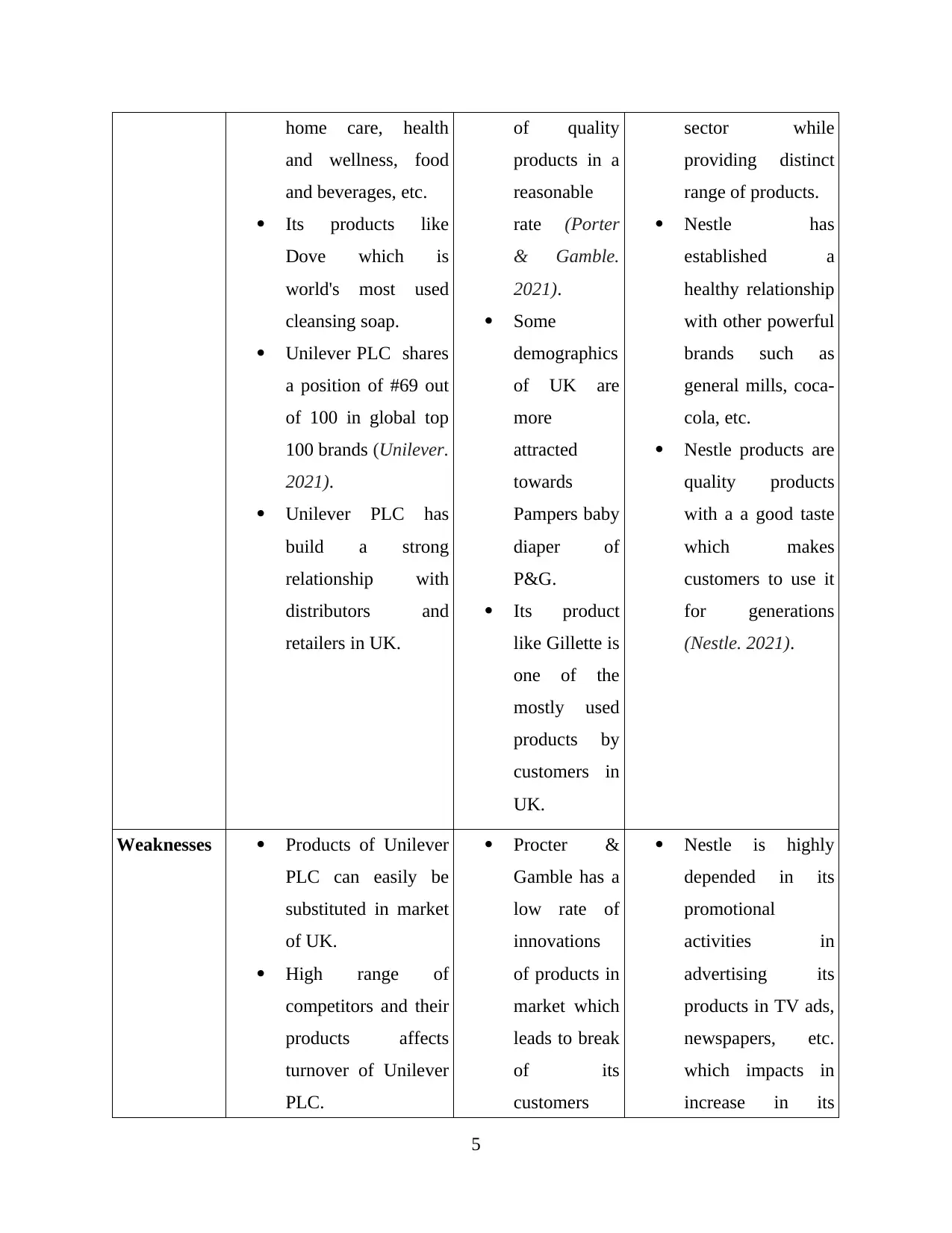
home care, health
and wellness, food
and beverages, etc.
Its products like
Dove which is
world's most used
cleansing soap.
Unilever PLC shares
a position of #69 out
of 100 in global top
100 brands (Unilever.
2021).
Unilever PLC has
build a strong
relationship with
distributors and
retailers in UK.
of quality
products in a
reasonable
rate (Porter
& Gamble.
2021).
Some
demographics
of UK are
more
attracted
towards
Pampers baby
diaper of
P&G.
Its product
like Gillette is
one of the
mostly used
products by
customers in
UK.
sector while
providing distinct
range of products.
Nestle has
established a
healthy relationship
with other powerful
brands such as
general mills, coca-
cola, etc.
Nestle products are
quality products
with a a good taste
which makes
customers to use it
for generations
(Nestle. 2021).
Weaknesses Products of Unilever
PLC can easily be
substituted in market
of UK.
High range of
competitors and their
products affects
turnover of Unilever
PLC.
Procter &
Gamble has a
low rate of
innovations
of products in
market which
leads to break
of its
customers
Nestle is highly
depended in its
promotional
activities in
advertising its
products in TV ads,
newspapers, etc.
which impacts in
increase in its
5
and wellness, food
and beverages, etc.
Its products like
Dove which is
world's most used
cleansing soap.
Unilever PLC shares
a position of #69 out
of 100 in global top
100 brands (Unilever.
2021).
Unilever PLC has
build a strong
relationship with
distributors and
retailers in UK.
of quality
products in a
reasonable
rate (Porter
& Gamble.
2021).
Some
demographics
of UK are
more
attracted
towards
Pampers baby
diaper of
P&G.
Its product
like Gillette is
one of the
mostly used
products by
customers in
UK.
sector while
providing distinct
range of products.
Nestle has
established a
healthy relationship
with other powerful
brands such as
general mills, coca-
cola, etc.
Nestle products are
quality products
with a a good taste
which makes
customers to use it
for generations
(Nestle. 2021).
Weaknesses Products of Unilever
PLC can easily be
substituted in market
of UK.
High range of
competitors and their
products affects
turnover of Unilever
PLC.
Procter &
Gamble has a
low rate of
innovations
of products in
market which
leads to break
of its
customers
Nestle is highly
depended in its
promotional
activities in
advertising its
products in TV ads,
newspapers, etc.
which impacts in
increase in its
5
⊘ This is a preview!⊘
Do you want full access?
Subscribe today to unlock all pages.

Trusted by 1+ million students worldwide
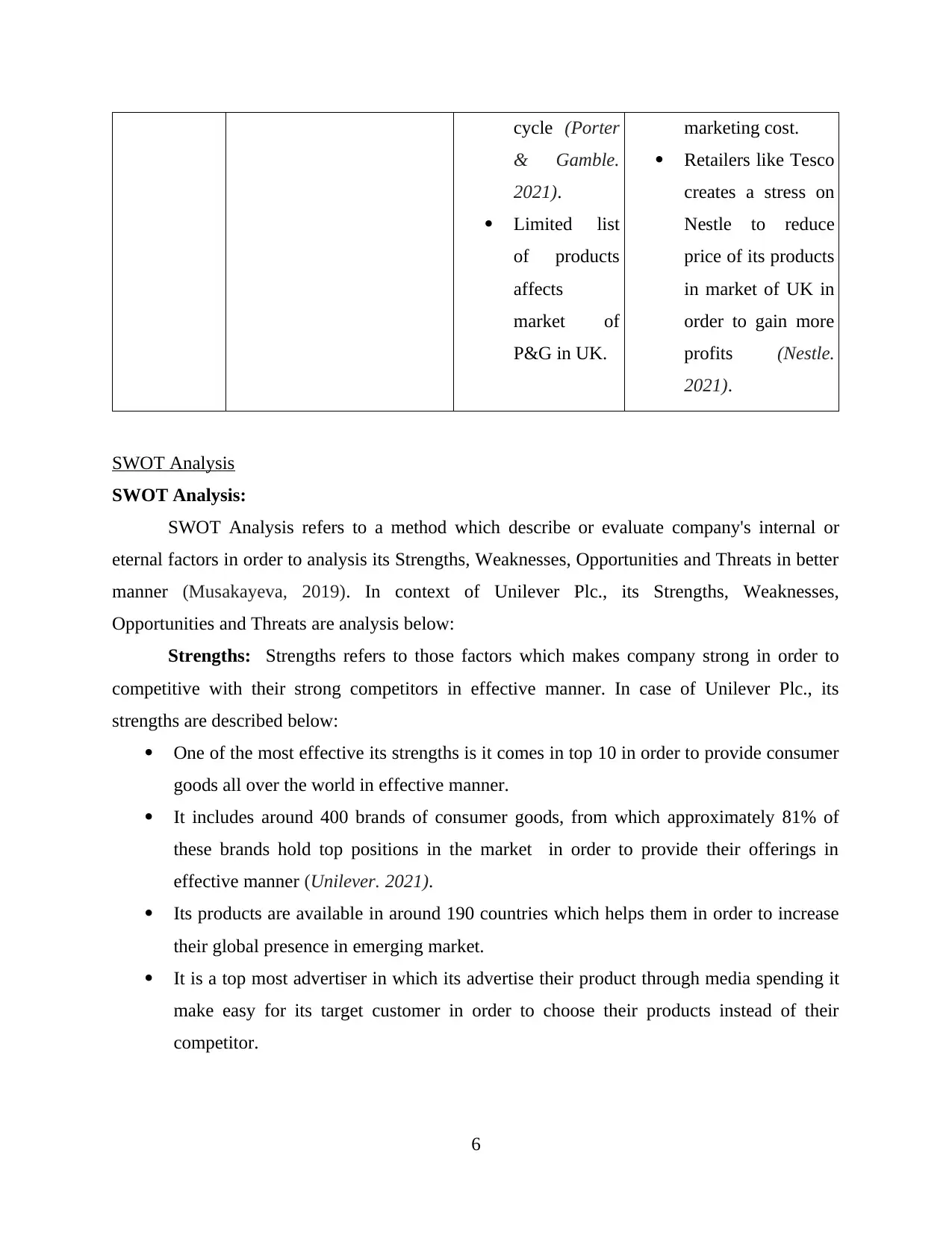
cycle (Porter
& Gamble.
2021).
Limited list
of products
affects
market of
P&G in UK.
marketing cost.
Retailers like Tesco
creates a stress on
Nestle to reduce
price of its products
in market of UK in
order to gain more
profits (Nestle.
2021).
SWOT Analysis
SWOT Analysis:
SWOT Analysis refers to a method which describe or evaluate company's internal or
eternal factors in order to analysis its Strengths, Weaknesses, Opportunities and Threats in better
manner (Musakayeva, 2019). In context of Unilever Plc., its Strengths, Weaknesses,
Opportunities and Threats are analysis below:
Strengths: Strengths refers to those factors which makes company strong in order to
competitive with their strong competitors in effective manner. In case of Unilever Plc., its
strengths are described below:
One of the most effective its strengths is it comes in top 10 in order to provide consumer
goods all over the world in effective manner.
It includes around 400 brands of consumer goods, from which approximately 81% of
these brands hold top positions in the market in order to provide their offerings in
effective manner (Unilever. 2021).
Its products are available in around 190 countries which helps them in order to increase
their global presence in emerging market.
It is a top most advertiser in which its advertise their product through media spending it
make easy for its target customer in order to choose their products instead of their
competitor.
6
& Gamble.
2021).
Limited list
of products
affects
market of
P&G in UK.
marketing cost.
Retailers like Tesco
creates a stress on
Nestle to reduce
price of its products
in market of UK in
order to gain more
profits (Nestle.
2021).
SWOT Analysis
SWOT Analysis:
SWOT Analysis refers to a method which describe or evaluate company's internal or
eternal factors in order to analysis its Strengths, Weaknesses, Opportunities and Threats in better
manner (Musakayeva, 2019). In context of Unilever Plc., its Strengths, Weaknesses,
Opportunities and Threats are analysis below:
Strengths: Strengths refers to those factors which makes company strong in order to
competitive with their strong competitors in effective manner. In case of Unilever Plc., its
strengths are described below:
One of the most effective its strengths is it comes in top 10 in order to provide consumer
goods all over the world in effective manner.
It includes around 400 brands of consumer goods, from which approximately 81% of
these brands hold top positions in the market in order to provide their offerings in
effective manner (Unilever. 2021).
Its products are available in around 190 countries which helps them in order to increase
their global presence in emerging market.
It is a top most advertiser in which its advertise their product through media spending it
make easy for its target customer in order to choose their products instead of their
competitor.
6
Paraphrase This Document
Need a fresh take? Get an instant paraphrase of this document with our AI Paraphraser
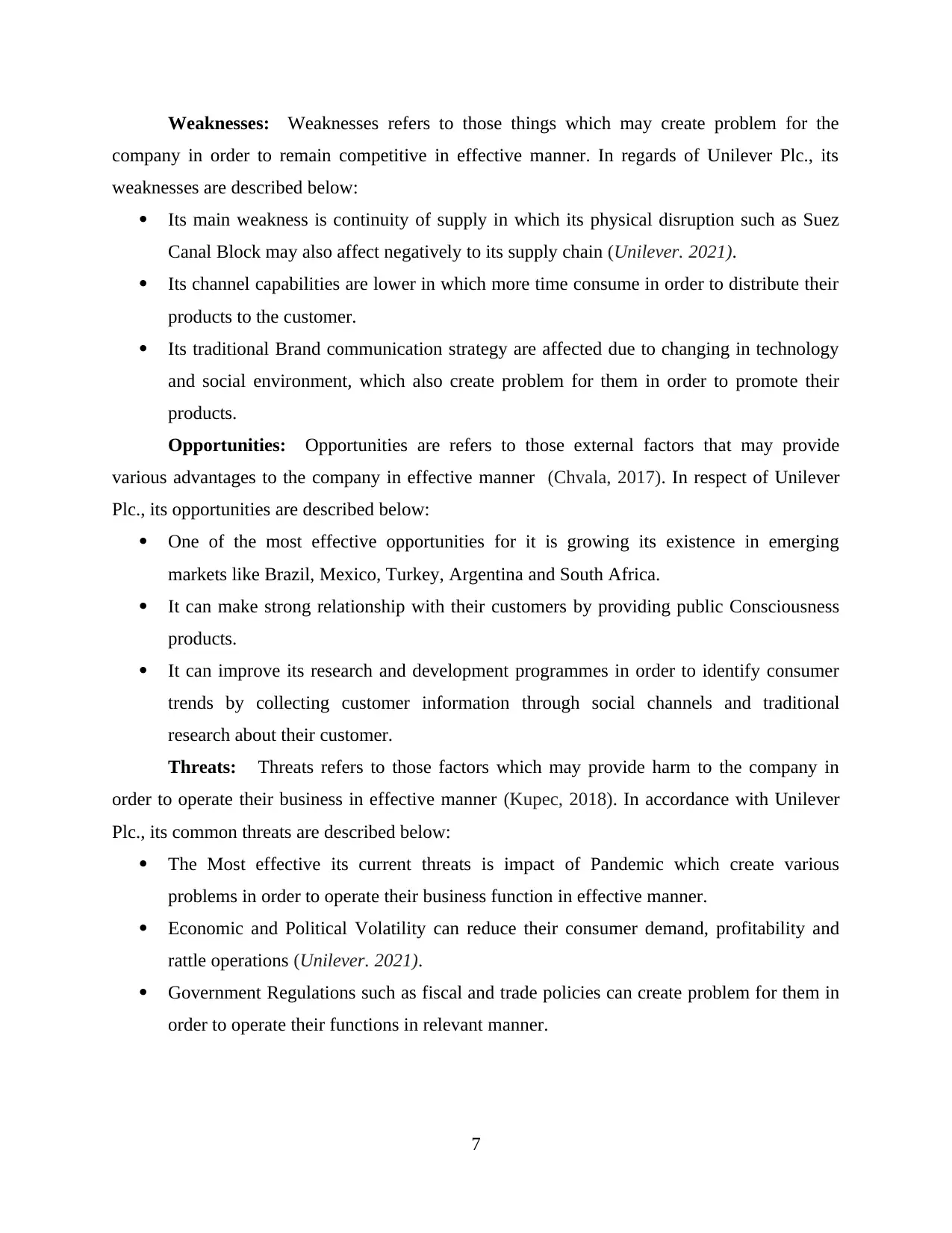
Weaknesses: Weaknesses refers to those things which may create problem for the
company in order to remain competitive in effective manner. In regards of Unilever Plc., its
weaknesses are described below:
Its main weakness is continuity of supply in which its physical disruption such as Suez
Canal Block may also affect negatively to its supply chain (Unilever. 2021).
Its channel capabilities are lower in which more time consume in order to distribute their
products to the customer.
Its traditional Brand communication strategy are affected due to changing in technology
and social environment, which also create problem for them in order to promote their
products.
Opportunities: Opportunities are refers to those external factors that may provide
various advantages to the company in effective manner (Chvala, 2017). In respect of Unilever
Plc., its opportunities are described below:
One of the most effective opportunities for it is growing its existence in emerging
markets like Brazil, Mexico, Turkey, Argentina and South Africa.
It can make strong relationship with their customers by providing public Consciousness
products.
It can improve its research and development programmes in order to identify consumer
trends by collecting customer information through social channels and traditional
research about their customer.
Threats: Threats refers to those factors which may provide harm to the company in
order to operate their business in effective manner (Kupec, 2018). In accordance with Unilever
Plc., its common threats are described below:
The Most effective its current threats is impact of Pandemic which create various
problems in order to operate their business function in effective manner.
Economic and Political Volatility can reduce their consumer demand, profitability and
rattle operations (Unilever. 2021).
Government Regulations such as fiscal and trade policies can create problem for them in
order to operate their functions in relevant manner.
7
company in order to remain competitive in effective manner. In regards of Unilever Plc., its
weaknesses are described below:
Its main weakness is continuity of supply in which its physical disruption such as Suez
Canal Block may also affect negatively to its supply chain (Unilever. 2021).
Its channel capabilities are lower in which more time consume in order to distribute their
products to the customer.
Its traditional Brand communication strategy are affected due to changing in technology
and social environment, which also create problem for them in order to promote their
products.
Opportunities: Opportunities are refers to those external factors that may provide
various advantages to the company in effective manner (Chvala, 2017). In respect of Unilever
Plc., its opportunities are described below:
One of the most effective opportunities for it is growing its existence in emerging
markets like Brazil, Mexico, Turkey, Argentina and South Africa.
It can make strong relationship with their customers by providing public Consciousness
products.
It can improve its research and development programmes in order to identify consumer
trends by collecting customer information through social channels and traditional
research about their customer.
Threats: Threats refers to those factors which may provide harm to the company in
order to operate their business in effective manner (Kupec, 2018). In accordance with Unilever
Plc., its common threats are described below:
The Most effective its current threats is impact of Pandemic which create various
problems in order to operate their business function in effective manner.
Economic and Political Volatility can reduce their consumer demand, profitability and
rattle operations (Unilever. 2021).
Government Regulations such as fiscal and trade policies can create problem for them in
order to operate their functions in relevant manner.
7
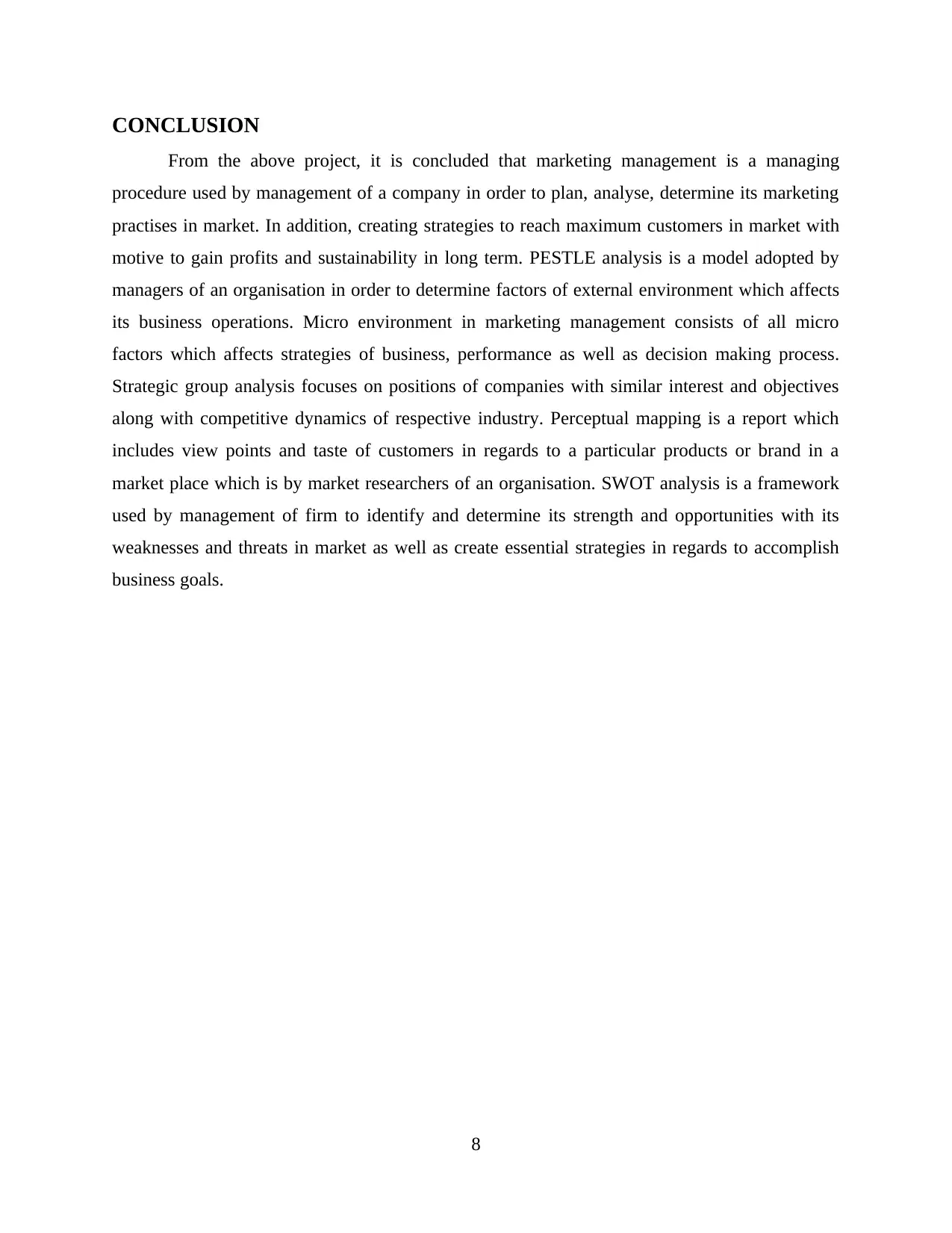
CONCLUSION
From the above project, it is concluded that marketing management is a managing
procedure used by management of a company in order to plan, analyse, determine its marketing
practises in market. In addition, creating strategies to reach maximum customers in market with
motive to gain profits and sustainability in long term. PESTLE analysis is a model adopted by
managers of an organisation in order to determine factors of external environment which affects
its business operations. Micro environment in marketing management consists of all micro
factors which affects strategies of business, performance as well as decision making process.
Strategic group analysis focuses on positions of companies with similar interest and objectives
along with competitive dynamics of respective industry. Perceptual mapping is a report which
includes view points and taste of customers in regards to a particular products or brand in a
market place which is by market researchers of an organisation. SWOT analysis is a framework
used by management of firm to identify and determine its strength and opportunities with its
weaknesses and threats in market as well as create essential strategies in regards to accomplish
business goals.
8
From the above project, it is concluded that marketing management is a managing
procedure used by management of a company in order to plan, analyse, determine its marketing
practises in market. In addition, creating strategies to reach maximum customers in market with
motive to gain profits and sustainability in long term. PESTLE analysis is a model adopted by
managers of an organisation in order to determine factors of external environment which affects
its business operations. Micro environment in marketing management consists of all micro
factors which affects strategies of business, performance as well as decision making process.
Strategic group analysis focuses on positions of companies with similar interest and objectives
along with competitive dynamics of respective industry. Perceptual mapping is a report which
includes view points and taste of customers in regards to a particular products or brand in a
market place which is by market researchers of an organisation. SWOT analysis is a framework
used by management of firm to identify and determine its strength and opportunities with its
weaknesses and threats in market as well as create essential strategies in regards to accomplish
business goals.
8
⊘ This is a preview!⊘
Do you want full access?
Subscribe today to unlock all pages.

Trusted by 1+ million students worldwide
1 out of 13
Related Documents
Your All-in-One AI-Powered Toolkit for Academic Success.
+13062052269
info@desklib.com
Available 24*7 on WhatsApp / Email
![[object Object]](/_next/static/media/star-bottom.7253800d.svg)
Unlock your academic potential
Copyright © 2020–2026 A2Z Services. All Rights Reserved. Developed and managed by ZUCOL.





